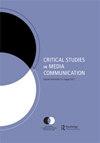“媒体研究的未来是游戏研究”
IF 1.5
2区 文学
Q3 COMMUNICATION
引用次数: 3
摘要
游戏研究作为媒介和/或传播研究的一个分支,在批判媒体研究中占据了一个奇怪的位置。那些致力于电子游戏研究批判理论的人理解这一子领域的重要性,而那些不研究或玩电子游戏的人则倾向于将这一主题视为“其他”——与媒体研究工作的其他理论部门截然不同。然而,正如游戏学者在本期特邀文章中所解释的那样,游戏现在是媒体内容、媒体平台和技术以及媒体受众融合的核心组成部分。因此,帮助我们理解游戏及其文化的理论和方法与理解更广泛的媒体制作和使用越来越相关。因此,这期特刊的目标是提供各种方法和细节,以帮助游戏研究内外的学者。本文章由计算机程序翻译,如有差异,请以英文原文为准。
“The future of media studies is game studies”
ABSTRACT Game studies, as a subfield of media and/or communication studies, has occupied an odd place within critical media studies. Those who are invested in critical theory of video game studies understand the importance of the subfield, those who do not study or play video games tend to think of the topic as “other”—as distinct from other theoretical compartments of media studies work. Yet, as the games scholars in this invited issue explain, games are now a central component in the convergence of media content, media platforms and technologies, and media audiences. Theories and methods that help us understand games and their culture are therefore increasingly relevant to understanding wider media production and use. The goal with this special issue, therefore, was to offer a variety of approaches and specifics that would be helpful to scholars both within and beyond game studies.
求助全文
通过发布文献求助,成功后即可免费获取论文全文。
去求助
来源期刊

Critical Studies in Media Communication
COMMUNICATION-
CiteScore
2.10
自引率
0.00%
发文量
34
期刊介绍:
Critical Studies in Media Communication (CSMC) is a peer-reviewed publication of the National Communication Association. CSMC publishes original scholarship in mediated and mass communication from a cultural studies and/or critical perspective. It particularly welcomes submissions that enrich debates among various critical traditions, methodological and analytical approaches, and theoretical standpoints. CSMC takes an inclusive view of media and welcomes scholarship on topics such as • media audiences • representations • institutions • digital technologies • social media • gaming • professional practices and ethics • production studies • media history • political economy. CSMC publishes scholarship about media audiences, representations, institutions, technologies, and professional practices. It includes work in history, political economy, critical philosophy, race and feminist theorizing, rhetorical and media criticism, and literary theory. It takes an inclusive view of media, including newspapers, magazines and other forms of print, cable, radio, television, film, and new media technologies such as the Internet.
 求助内容:
求助内容: 应助结果提醒方式:
应助结果提醒方式:


